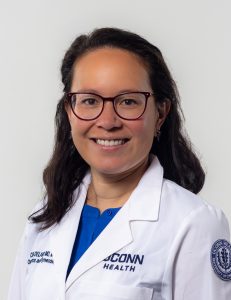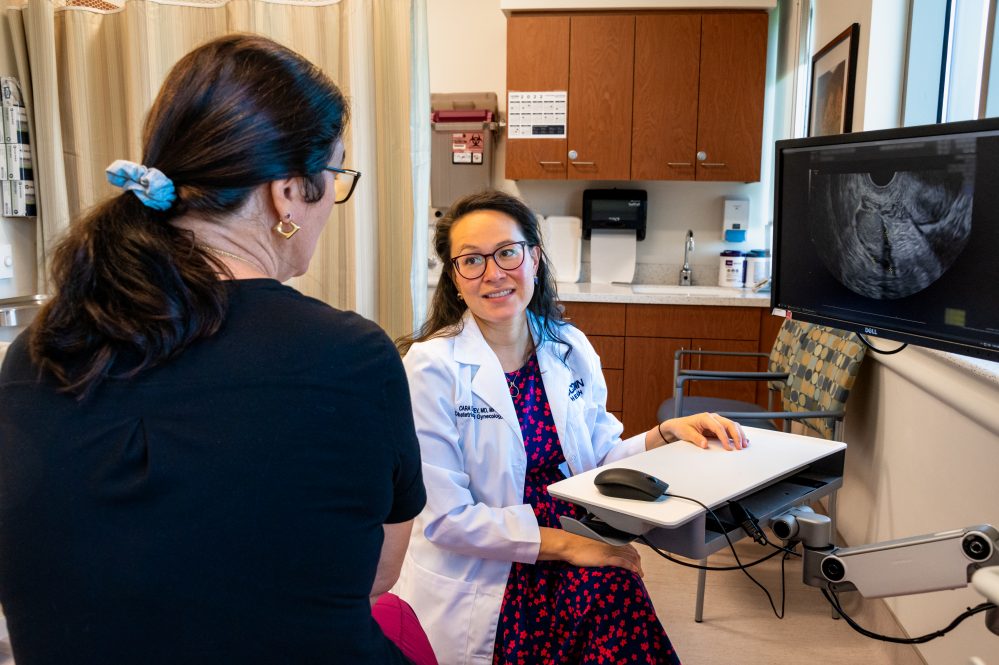For patients who may be going through the most challenging and difficult time in their lives, Dr. Cara Delaney, assistant professor of Obstetrics and Gynecology and Dr. Neena Qasba, Division Director of Complex Family Planning at UConn Health, create a supportive environment through their community-centric Family Planning Service.

Delaney and Qasba who are two of the six doctors in Connecticut fellowship trained in complex family planning are expanding the hours of the Family Planning Service at UConn Health to provide a full spectrum of OB/GYN care and serve women with complex medical conditions. The fellowship in Complex Family Planning is a two-year program focused on subspecialist training in research, teaching, advocacy, and clinical practice in abortion and contraception.
Committed to reproductive equity, they offer full-scope family planning services, including personalized contraception counseling, all approved methods of birth control, miscarriage and abortion care. They provide expert, evidence-based care, and treat every person with compassion, dignity, and respect.
We believe all people should make their own decisions about their reproductive health needs. Family planning care encompasses pregnancy prevention as well as timing or spacing planned pregnancies. The expansion of the services of complex family planning includes:
• Contraceptive issues with IUDs and implants
• Early Pregnancy Assessment and Miscarriage Care
• Contraceptive care for people with medical conditions
• Medication and procedural abortion care
• Contraceptive care for LGBTQI+
• Surgical sterilization procedures
Gynecologists and obstetricians can provide contraceptive counseling for most women; however, complex family planning physicians are specially trained in addressing potential interactions between medical problems and birth control methods.

A complex birth control consultation with a specialty-trained physician provides expertise in contraceptive management for women with complex medical conditions who may have increased danger to their health or increased risk of failure when using birth control. Patients include those with conditions such as bleeding disorders, blood clots, heart disease, stroke history, seizure disorder or a current cancer diagnosis.
The selection of a safe contraceptive is more challenging for women with complex medical conditions, leading many patients to think that the birth control pill is their only option. However, there are other options that won’t interfere with their health or medications that they take. Drs. Delaney and Qasba have extensive experience placing IUDs and implants.
The Early Pregnancy Assessment Service within family planning provides early ultrasound for patients with signs of miscarriage or other reasons for early pregnancy bleeding.
“Often when a person starts to experience signs of miscarriage, they are sent to the Emergency Department where they are diagnosed with a potential miscarriage and released without a plan. The expanded hours of the family planning service provide an alternative where they are assessed, evaluated and a plan is created specific to that patient in a timely manner,” says Delaney.
Delaney and Qasba are specially trained in second-trimester surgical abortion which is performed for therapeutic abortion, fetal demise, and for pregnancy termination due to fetal anomalies and maternal health conditions.
The doctors support patients through the entire process of counseling, treatment, and follow-up with attention to meeting each individual’s family planning and pregnancy goals.
“Patients come to us for different reasons and with lived experiences, and we provide them with timely, evidence-based, compassionate care,” says Qasba.
The Department of Obstetrics and Gynecology at UConn Health supports our patients’ health care needs throughout their lives. In the wake of the June 2022 decision by the Supreme Court of the United States to overturn Roe v. Wade, we want to make it clear to our patients and community that access to reproductive health care, including abortion care and contraception remains unchanged in Connecticut and at UConn Health.
For more information about the Department of Obstetrics and Gynecology at UConn Health, call 1-84-GET-UCONN.
UConn Health is the recipient of the 2024 Women’s Choice Best Hospitals for OB/GYN Care. 



